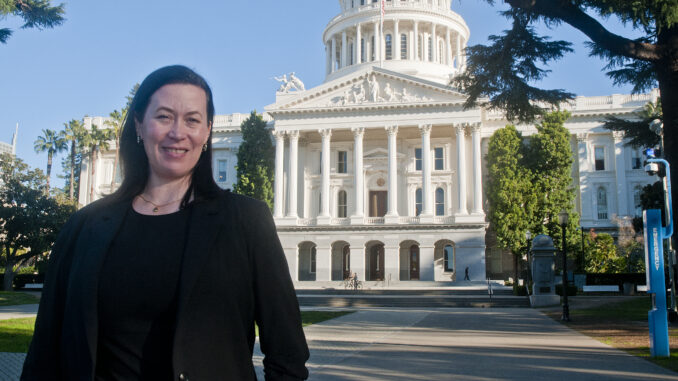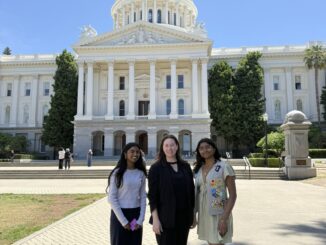
Will the U.S. finally ratify the Equal Rights Amendment?
by Dorothy Korber
In 1923, buoyed by the victory that won American women the right to vote, suffragettes tackled their next goal: amending the U.S. Constitution to make sex-based equality an explicit right. From this came the Equal Rights Amendment, which United States Supreme Court justice Ruth Bader Ginsburg once described as “an unassailable basis for applying the bedrock principle: All men and women are guaranteed by the Constitution equal justice under law.”
The amendment itself is concise: “Equality of rights under the law shall not be denied or abridged by the United States or by any state on account of sex.”
The ERA was passed by Congress in 1972, and in 2020 finally met the constitutional requirement of ratification by 38 states. But today, a century after it was proposed, the amendment remains stalled in a political and legal limbo.
“The fight to publish the 28th Amendment continues, and we will not rest until women see ourselves reflected as whole and equal citizens in the U.S. Constitution.”
Darcy Totten, Executive Director, California Commission on the Status of Women and Girls
“The battle for equality is far from over,” says Zakiya Thomas, president of the ERA Coalition, which comprises more than 300 partner organizations nationwide. “We will persist because gender equality is non-negotiable and enshrining it in our Constitution is long overdue.”
She cites recent polling showing 61% of voters support the amendment— including 87% of Democrats, 64% of independents, and 35% of Republicans.
“This public mandate strengthens our resolve,” Thomas says.
The California Commission on the Status of Women and Girls (CCSWG) joined the ERA Coalition in 2022. Along with its partner, the Mount Saint Mary’s Center for the Advancement of Women, they have collaborated with the ERA Coalition on events, community gatherings, and film screenings designed to raise awareness about the power of the ERA to impact women’s lives in California and across the nation.
“The commission operates as both a convening and gender-advisory body,” says Darcy Totten, CCSWG’s executive director. “Under that broad umbrella, we work diligently to apply a gender-lens to all aspects of life in California, helping to highlight where sex inequality persists and the critical impact it has on women, girls, communities and our entire economy and culture.”
In 2022 the Commission issued a statewide Blueprint for Women’s Pandemic Economic Recovery that focused a gender lens on California’s economy as a whole. One key takeaway is that some inequities are difficult to address without foundational principles of equality embedded in the Constitution, as laws governing women’s equality are relatively recent.
“We are watching in real time as decades of progress are rolled back,” Totten says. “It is the Constitution from which our laws are interpreted and adjudicated to protect the progress we have made, as well as to close the remaining gaps in opportunity and access to the promises of America for women and girls.”
Supporters of the ERA contend it has already met all the constitutional criteria for a new amendment. But opponents argue that when Congress passed the ERA, it gave states until 1982 to ratify the amendment, a deadline that wasn’t met. Therefore, they say, the ERA is void and must start the whole ratification process again.
In late 2024, Congressional Democrats pushed President Joe Biden to ignore the deadline issue as an outdated technicality and enshrine the ERA as the 28th Amendment. Although he supports the ERA, Biden declined to act. Now, with Republicans set to take control of the White House and Congress, the political calculus is shifting again.
On Jan. 17, however, as he readied to leave office, Biden declined to push for publication, saying that while he believes that the ERA has met the requirements of ratification and therefore is part of the Constitution, he would not order the government to finalize the process by officially publishing it.
Against the backdrop of the Supreme Court’s dismantling of Roe v Wade, proponents of the amendment argue that protecting women’s reproductive rights makes the ERA critically important today.
“President Biden’s decision to declare the Equal Rights Amendment as the 28th Amendment to the Constitution is a victory for all who believe in justice, equality, and fairness,” Totten says. “The fight to publish the 28th Amendment continues, and we will not rest until women see ourselves reflected as whole and equal citizens in the U.S. Constitution.”
The ERA is more necessary than ever, Thomas adds.
“We’ve seen abortion access under attack across the country. The ERA is vitally relevant in this battle. Pennsylvania and Nevada, for example, have both used their state ERAs to protect abortion access,” she says.
What’s the next step for supporters of the amendment? MSMU’s Nicole Haggard, PhD, believes a multi-pronged approach is the answer.
“We’ve come to realize is that where there is energy and [where] people are excited, that’s how we should move forward,” says Haggard, director of the Center for the Advancement of Women at MSMU.
Issues that resonate for individual women can range from domestic violence to job discrimination. They are examined in detail in “The Cost of Being a Woman,” the 2024 report on the status of women and girls in California. Haggard is a co-author of the report, issued annually by MSMU.
“When you look through a gender lens, you discover so many hidden costs of being a woman,” she says. “One example: We know health insurance costs women 30% more than men in out-of-pocket costs. When you have the ERA, it will be so easy for Congress to move forward—the legal precedent is right there in the Constitution.”
Another step forward is to back political candidates who support the amendment. The ERA Coalition’s Elect Equality Campaign can help voters find such candidates, said coalition president Thomas.
“This is a fight for the people’s Constitution and for a more just and equitable country,” Thomas says. “The ERA has met all constitutional requirements, and we will see it recognized as the 28th Amendment.”
For more information on The California Commission on the Status of Women and Girls visit https://women.ca.gov/.



